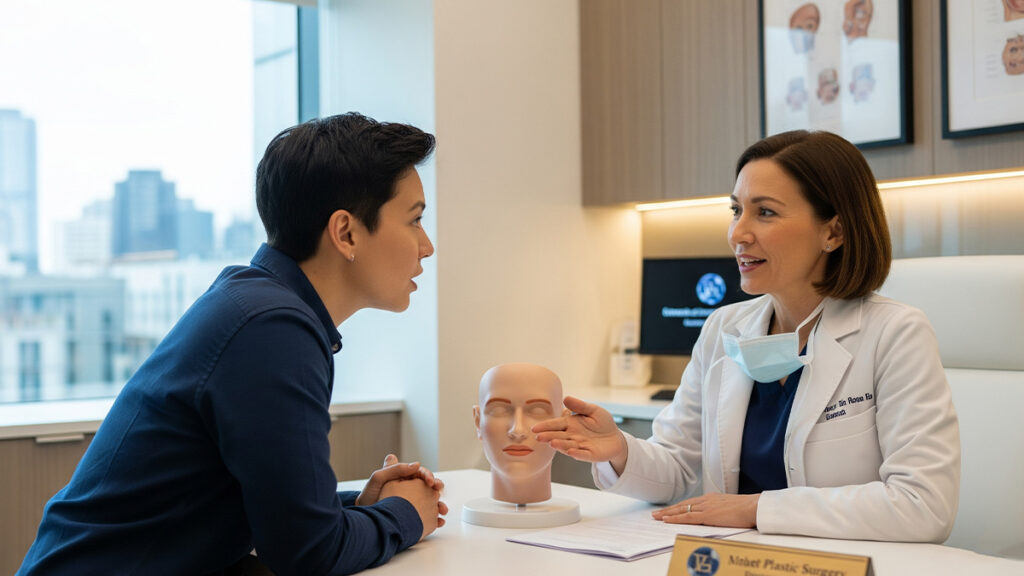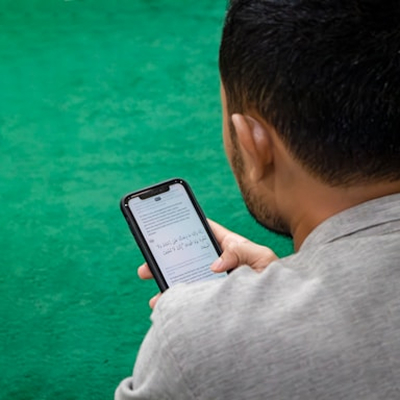Table of Contents
- Improving Listening Skills to Be a Better Listener
- Why Listening Matters in a Plastic Surgery Practice
- Barriers to Good Listening
- Core Principles of Better Listening
- Listening in Different Areas of the Practice
- Practical Phrases You Can Use to be a Better Listener
- Quick Daily Habits to Improve Listening
- Benefits of Listening Better
- How Often Do Doctors Interrupt Patients? – Medical Research
- Medicolegal Risks with Patient Communication Gaps
-
- Communication & Listening Experts – whose work applies directly to healthcare:
- Medical & Clinical Communication Experts – Focused on doctors, nurses, and healthcare staff:
- Practical Books for Staff Training – For front desk, patient coordination, and surgery team settings:
- Website Articles & Reports about Listening
- Team Training Tips
-
- Q: Why do doctors interrupt patients so quickly during consultations?
- Q: What are the medicolegal risks of poor communication in plastic surgery?
- Q: How does active listening improve patient satisfaction in cosmetic surgery consultations?
- Q: What are Oscar Trimboli’s 5 levels of deep listening and how can surgeons use them?
- Q: How can front desk staff use listening skills to reduce cancellations and no-shows?
- Q: What listening techniques reduce patient anxiety before surgery?
- Q: How does poor listening contribute to defensive medicine?
- Q: What are the best phrases for surgeons to show empathy and understanding?
- Q: How can we improve and train our listening skills?
- Q: What is the link between listening skills and patient referrals in cosmetic surgery?
- Q: How can plastic surgeons avoid interrupting patients too early?
- Taking Action and Implementing
Improving Listening Skills to Be a Better Listener
Listening is one of the most underrated skills in a plastic surgery practice. Cosmetic Surgery and Aesthetic Patients are often nervous, emotional, and unsure when they visit. They want to feel heard just as much as they want expert advice. At the same time, staff and surgeons juggle busy schedules, multiple tasks, and the pressure of delivering excellent results.
Improving listening skills across the whole team — from front desk staff to surgeons — makes a noticeable difference in patient satisfaction, teamwork, and overall clinic success.
Why Listening Matters in a Plastic Surgery Practice
- Builds trust — Patients feel safe and valued when they know you are truly listening.
- Increases satisfaction — Patients leave more confident when their concerns have been heard.
- Avoids mistakes — Careful listening reduces misunderstandings about treatments, costs, or outcomes.
- Improves teamwork — Staff who listen to each other communicate more clearly and reduce stress.
- Boosts referrals — A patient who feels understood is more likely to recommend the clinic.
Barriers to Good Listening
Listening sounds simple, but many things get in the way:
- Rushing through appointments or calls.
- Thinking about your next task instead of the conversation.
- Interrupting or finishing someone’s sentence.
- Looking at screens or phones instead of the speaker.
- Assuming you know what the patient means before they finish.
- Feeling defensive when a patient raises concerns.
The first step to becoming a better listener is noticing these habits and choosing to change them.
Core Principles of Better Listening
- Pay more attention and be fully present
- Face the person, make eye contact, and put distractions aside.
- Show with your body language that you are engaged. Lean in.
- Avoid interrupting
- Let the patient or colleague finish speaking.
- Pauses are powerful — silence gives them space to share more.
- Show empathy
- Acknowledge feelings: “I can hear this is worrying you.”
- Use a warm tone of voice and kind facial expressions.
- Repeat back and clarify
- Summarize what you heard: “So you’re saying the downtime is your main concern, correct?”
- This avoids mistakes and shows you understood.
- Ask open questions
- Use prompts like “Tell me more about that” or “What worries you most?”
- This encourages deeper, more honest answers.
Listening in Different Areas of the Practice
- Listening During Patient Consultations (Surgeons and Nurses)
- Start with an open invitation: “What would you like to achieve?”
- Listen for both words and emotions.
- Mirror back key phrases: if the patient says “I just want to look refreshed,” repeat their key words.
- Summarize / Paraphrase before giving your opinion: “I hear you want subtle, natural results with minimal downtime.”
- Listening at the Front Desk or on the Phone
- Smile and make eye contact (patients can hear a smile over the phone).
- Avoid multitasking when speaking to a patient.
- Use their name: “Thanks for sharing that, Sarah.”
- Note down details in the system so the surgeon or nurse can pick up the conversation later.
- Listening Within the Team
- In meetings, let one person finish before others speak.
- Repeat instructions back: “So you’d like me to call the patient this afternoon and confirm her booking?”
- Avoid “listening to reply” — focus on understanding, not arguing.
- Check for agreement: “Does everyone feel clear about the next steps?”
Practical Phrases You Can Use to be a Better Listener
- “Tell me more about that.”
- “What’s the most important thing for you today?”
- “I can see this matters a lot to you.”
- “Let me make sure I understood…”
- “What I’m hearing is…”
- “Thank you for sharing that with me.”
Quick Daily Habits to Improve Listening
- Put away your mobile phone or close your laptop during patient conversations.
- Pause for 2 or 3 seconds after someone finishes before responding.
- Use the patient’s or colleague’s name at least once in the conversation.
- Summarize one key point back in every conversation.
- Practice “one-minute listening” – once a day, give full attention to someone for 60 seconds without interrupting.
Benefits of Listening Better
- Patients feel valued and respected.
- Fewer complaints and misunderstandings.
- Stronger teamwork and smoother handovers.
- More accurate treatment planning.
- Better word-of-mouth referrals and repeat patients.
How Often Do Doctors Interrupt Patients? – Medical Research
- Early and frequent interruptions: Multiple studies show that doctors tend to interrupt patients very early. Research from the U.S. and Spain demonstrates that patients are interrupted in just 18–23 seconds on average when presenting their concerns
- Even shorter durations: A separate study recorded an average interruption time of just 11 seconds, highlighting how rushed many patient encounters are
- Only partial patient narratives are heard: Another finding reported that less than 25% of patients are allowed to complete their initial statements before being interrupted
- Interruptions are enot always negative: A 2022 quantitative study analyzed natural clinical conversations and found that most interruptions (around 83%) were “cooperative”- clinicians were helpful or supportive – rather than intrusive .
Medicolegal Risks with Patient Communication Gaps
Poor communication is a well-known driver of patient dissatisfaction, bad reviews and litigation:
- A Canadian retrospective review of medical regulatory complaints (2015–2020) identified communication issues—including lack of empathy, unclear explanations, and poor informed consent—as key contributors to medico-legal complaints
- A broader systematic review highlights that ineffective communication, inadequate empathy, and insufficient patient involvement all increase the likelihood of complaints or legal claims
- Legal experts note that the majority of malpractice claims—perhaps 80%—stem from issues in the doctor–patient relationship, not technical or procedural errors
Implications for a Plastic Surgery Practice
Why Good Listening matters:
- In aesthetic medicine, perception and trust are everything. Patients value feeling deeply heard and understood – both for emotional reassurance and clarity of expectations.
- Listening actively not only enhances patient satisfaction but reduces the emotional triggers that can lead to complaints or litigation.
Practical Tips for Listening Better:
- Pause intentionally after a patient begins sharing – avoid interrupting for at least 30 seconds whenever possible.
- Use sympathetic, clarifying language: e.g., “Let me make sure I understand,” or “Tell me more about that.”
- Make empathy and clear communication core training elements, not afterthoughts.
- Document patient concerns and your responses carefully. Strong documentation combined with good listening builds legal defensibility.
Make empathetic listening your clinic’s secret advantage. Start today with one simple change: give each patient and colleague your full attention for just a few minutes. The results will speak for themselves.
Experts & Resources on Listening Better
-
Communication & Listening Experts – whose work applies directly to healthcare:
- Oscar Trimboli – Deep Listening – Impact Beyond Words
- Julian Treasure – Author of How to Be Heard. Famous TED Talk “5 Ways to Listen Better” is a powerful training clip for staff.
- Carl Rogers – Pioneer of person-centered therapy. His work on active listening and unconditional positive regard is the bedrock of patient-centered communication.
- Michael P. Nichols – The Lost Art of Listening: How Learning to Listen Can Improve Relationships. Accessible and practical for everyday conversations.
-
Medical & Clinical Communication Experts – Focused on doctors, nurses, and healthcare staff:
- Robert Buckman – How to Break Bad News: A Guide for Health Care Professionals. Though focused on difficult conversations, his structured approach to listening is extremely applicable in aesthetics.
- Jonathan Silverman & Suzanne Kurtz – Skills for Communicating with Patients. Used in medical schools worldwide; emphasizes structuring consultations and listening carefully.
- Debra Roter & Judith Hall – Doctors Talking with Patients / Patients Talking with Doctors. Landmark research on physician–patient communication styles.
- Wendy Levinson – Physician and researcher. Her studies show poor communication, rather than technical errors, is a leading cause of malpractice suits.
-
Practical Books for Staff Training – For front desk, patient coordination, and surgery team settings:
- Just Listen by Mark Goulston — practical techniques for de-escalation, empathy, and really hearing people.
- Listening Well: The Art of Empathic Understanding by William R. Miller — step-by-step guide on reflective listening.
- Crucial Conversations: Tools for Talking When Stakes Are High (Patterson, Grenny, McMillan, Switzler) — great for staff–patient and staff–staff communication.
-
Website Articles & Reports about Listening
- Harvard Business Review – What Great Listeners Actually Do by Jack Zenger and Joseph Folkman (2016). Excellent evidence-based framework.
-
Team Training Tips
- Listen to Oscar Trimboli Listening Podcast
- Watch TED Talks:
- Julian Treasure — 5 Ways to Listen Better. TED VIDEO 8 minutes
- Celeste Headlee — 10 Ways to Have a Better Conversation. VIDEO 12 minutes
FAQs about Being a Better Listener
Q: Why do doctors interrupt patients so quickly during consultations?
- Studies show that many doctors interrupt patients within just 11–23 seconds of them starting to talk. This often happens because of time pressure, habit, or the assumption that the doctor already knows what the patient is about to say. While sometimes interruptions are cooperative, they can also prevent patients from fully explaining their goals and concerns. In a plastic surgery practice, giving patients at least 30 seconds without interruption often uncovers important details about their motivations, fears, and expectations.
Q: What are the medicolegal risks of poor communication in plastic surgery?
- Most malpractice and complaint cases are linked to poor communication rather than surgical technique. Patients who feel rushed, ignored, or misunderstood are more likely to file complaints or take legal action. Common issues include not listening carefully to patient goals, failing to explain downtime or risks clearly, and not documenting concerns. Building better listening habits and confirming understanding with patients significantly reduces these risks.
Q: How does active listening improve patient satisfaction in cosmetic surgery consultations?
- Active listening — focusing fully, avoiding interruptions, summarising back, and asking open-ended questions — helps patients feel heard and respected. In cosmetic surgery, where patients are often anxious about their appearance or outcome, active listening builds trust and reduces doubts. This translates into higher patient satisfaction, fewer misunderstandings, and better word-of-mouth referrals for the clinic.
Q: What are Oscar Trimboli’s 5 levels of deep listening and how can surgeons use them?
- Oscar Trimboli describes listening at five levels: listening to yourself, listening to content, listening to context, listening for what is unsaid, and listening for meaning. Surgeons and staff can use this 5 level model by:
- Noticing their own distractions before entering a consultation.
- Listening to the patient’s exact words and phrases.
- Considering the wider context (family, work, recovery time).
- Watching for what the patient avoids mentioning (e.g., cost, fear).
- Clarifying the deeper meaning behind their request (“I want to look natural because I don’t want people to know I had surgery”).
Q: How can front desk staff use listening skills to reduce cancellations and no-shows?
- Front desk staff are often the first point of contact. By listening carefully on phone calls and at reception, they can identify hidden concerns early — such as fear of cost, recovery time, or schedule timing issues. Reflecting back the patient’s concern (“It sounds like time off work is a big worry for you”) makes the patient feel supported, and allows staff to proactively offer solutions. This reduces cancellations, no-shows, and lost revenue.
Q: What listening techniques reduce patient anxiety before surgery?
Patients are often most nervous in the days leading up to surgery. Surgeons and staff can reduce anxiety by:
- Giving the patient uninterrupted space to share last-minute questions.
- Repeating key instructions and confirming understanding.
- Using empathetic reassuring phrases such as “It’s normal to feel nervous before surgery.”
- Listening for unspoken fears — many patients worry about pain, downtime, or regret but may not say it directly. Addressing these gently helps the patient feel reassured and confident.
Q: How does poor listening contribute to defensive medicine?
- Defensive medicine occurs when doctors order unnecessary tests or procedures to avoid legal complaints. Poor listening contributes because when doctors miss patient concerns, they may overcompensate by adding extra steps for protection. In contrast, good listening — clarifying goals, repeating back concerns, and documenting — reduces uncertainty and builds trust, making defensive practices less necessary.
Q: What are the best phrases for surgeons to show empathy and understanding?
- Effective listening phrases in a cosmetic consultation include:
- “Tell me more about what’s most important to you.”
- “It sounds like your biggest concern is recovery and downtime, is that right?”
- “I can hear that this matters a lot to you.”
- “Let me repeat back what I’ve heard, so we’re on the same page.”
Using these simple statements shows empathy, improves patient confidence, and reduces the chance of miscommunication.
Q: How can we improve and train our listening skills?
Plastic surgery practices can improve listening skills with simple role-plays and exercises:
- Partner listening drills — one person talks for two minutes, the other listens without interrupting, then repeats back.
- Phone role-plays — staff practice handling nervous or upset patient calls.
- Feedback rounds — in team meetings, staff share an example of when they felt truly heard that week.
These low-cost exercises create habits of empathy and reflection that translate into better patient care.
Q: What is the link between listening skills and patient referrals in cosmetic surgery?
- Patients who feel heard and respected are far more likely to recommend their surgeon to friends and family. Word-of-mouth referrals are built not just on results but also on how the patient felt throughout the process. A surgeon who listens carefully to concerns about cost, downtime, and outcome builds a reputation for compassion — which drives loyalty and referrals.
Q: How can plastic surgeons avoid interrupting patients too early?
- Plastic Surgeons can practice a “30-second rule”: allow the patient to speak for at least 30 seconds before asking a question or interrupting. Studies show most patients finish their opening story in under a minute, so waiting reduces the risk of missing important details. Surgeons can also practice taking notes silently, using eye contact, and summarising after the patient finishes.
Taking Action and Implementing
These findings collectively demonstrate that active listening is not just a courtesy but a core patient conversion and risk-reduction strategy for any medical or surgical practice.
Listening doesn’t cost anything – but it changes everything. When surgeons and staff listen with care, patients feel safer, more understood, and more confident in the clinic. Small daily habits, simple phrases, and a culture that values listening can turn an ordinary practice into an exceptional one.











